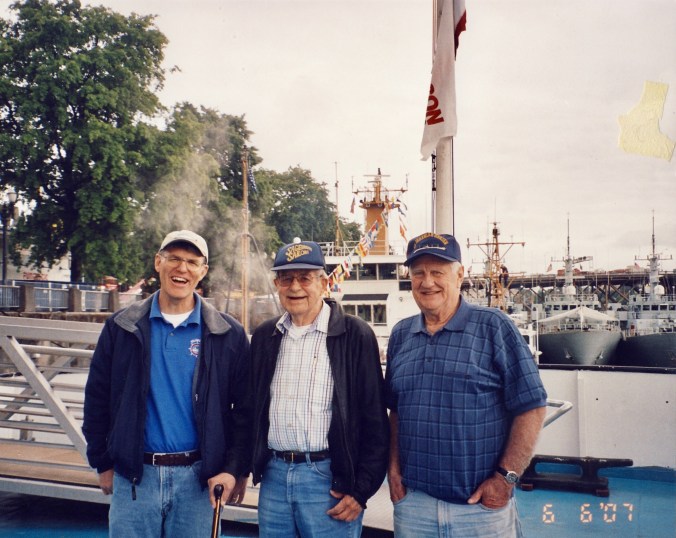 For the past ten years I have ridden the Portland Aerial Tram to work at OHSU, rising up to Portland’s Marquam Hill. In these four moments of travel time I have watched breathtaking sunrises and exquisite sunsets, gray socked in days amid torrential loud downpours, and once, in a gusty windstorm, my tram car stopped briefly and went backwards, if only for a moment. In the morning as I patiently wait my turn to board I witness the joy of a small child eager for her first ride, employees wheeling bikes or ready to steal a few moments of social media time, apprehensive patients, and up until now – the pounding of steel as crews built barges. Barge building that is no more with last week’s launch of the last barge.
For the past ten years I have ridden the Portland Aerial Tram to work at OHSU, rising up to Portland’s Marquam Hill. In these four moments of travel time I have watched breathtaking sunrises and exquisite sunsets, gray socked in days amid torrential loud downpours, and once, in a gusty windstorm, my tram car stopped briefly and went backwards, if only for a moment. In the morning as I patiently wait my turn to board I witness the joy of a small child eager for her first ride, employees wheeling bikes or ready to steal a few moments of social media time, apprehensive patients, and up until now – the pounding of steel as crews built barges. Barge building that is no more with last week’s launch of the last barge.
When I was a campfire girl at summer camp, like others of the 1960’s, I learned the song Barges. Quietly on late summer nights at our beach house I would sing its lyrics to my younger brothers, and decades later to my daughters as I rocked them in my lap. It was a song that had special meaning to my brothers and me, children of the Willamette River of the 1960’s. We knew barges, as they crept down river with yet more logs heading to an Oregon mill. My older brothers knew them as the best places to fish when they were tied briefly to the river banks – though that is a story you can read more about soon.
Out of my window looking in the night,
I can see the barges flickering light.
Silently flows the river to the sea,
As the barges go by silently.
Barges, I would like to go with you,
I would like to sail the ocean blue.
Barges, have you treasures in your hold?
Do you fight with pirates brave and bold?
And our dad, of course, knew all the big barge players: Bernert and Foss and Tidewater. When on the one occasion I was able to convince him to take a tram ride, he sat unsteadily on one of the few available seats, stared down at the floor and wouldn’t speak until we returned to ground. Heights terrified him. However, the end of the journey to the bottom adjacent to the building of barges relaxed his nervous spirit. These were his people. This was what he knew.
It wasn’t until reading the Oregonian’s piece on the closing of the barge operations last weekend did I learn that Zidell’s built their first barge in my birth year, 1961. Zidell’s grew out of a south waterfront – well what we call south waterfront now – scrap yard started by Russian immigrant Yeschie Zajdell, who later called himself Sam Zidell. With steel in high demand after WWII he found a business in dismantling ships, and as we later learned, leaving us with brownsfield and superfund legacies. In all, Zidell built 277 barges varying from 150 to 400 feet, built for all sorts of uses. And although Zidell’s will still be involved in leasing existing barges, we will see no more barge building as we aboard the aerial tram, but rather more urban living, medical and retail spaces, with a bit of room earmarked to perhaps help our senses adjust to the changing landscape of development, or what some may call progress.
But to those with their memories still firmly caught in the waterways of yore, the absence of the pounding of steel may in fact be a sad change. I know that Dad, and other river folks like him, would feel sadness at the end of an era, perhaps, his era.

River guys: Dad on far right. (Let me know if you know the other two identities!)
I remember singing that song! I grew up on the Oregon Coast – so I remember barges in the bay. It is sad they won’t be building barges anymore here – but I guess change is normal and they are probably building them less expensively somewhere else. A wonderful memory with a slight pang in it.
LikeLike
Pingback: From Zidell to Illahee: put these bunks to bed | Dede's Books and blog